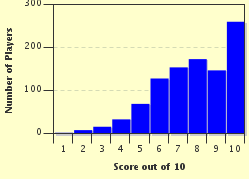Quiz Answer Key and Fun Facts
1. Grammatical structure in Celtic languages differs in many ways. For example there is no "having" of things. They are either "at you" or "with you".
The Irish Gaelic "Tá grá agam dhuit" means "I love you", but what is its literal translation?
2. If you were "old" in Cornwall, Wales or Brittany you would be "hen". In Gaelic you would be "sean", what do you think you would be on the Isle of Man?
3. Bara means bread in Welsh, Cornish and Breton, but what is the Gaelic word?
(Think of a fisherman's sweater.)
4. What are the two groupings that the six living Celtic languages are sorted into?
5. Cambrian, Cambric and Cymric have been used in reference to which of the Celtic Languages?
6. What province in Argentina has Welsh-speaking natives?
7. Which Celtic Language is spoken within the French region formally known as Armorica?
8. Which day of the week do you think these all translate to; dy' Sul, disul, Dé Domhnaigh, Jedoonee, Didòmhnaich, dydd Sul?
9. Nos da, Oidhche mhath, Oie vie, Oíche mhaith, Nos dha and Noz vat all mean the same thing. Which phrase might you say at the end of the day?
10. In which alphabet, also called the Celtic Tree Alphabet, were the earliest Old Irish writings?
Source: Author
markswood
This quiz was reviewed by FunTrivia editor
trident before going online.
Any errors found in FunTrivia content are routinely corrected through our feedback system.

